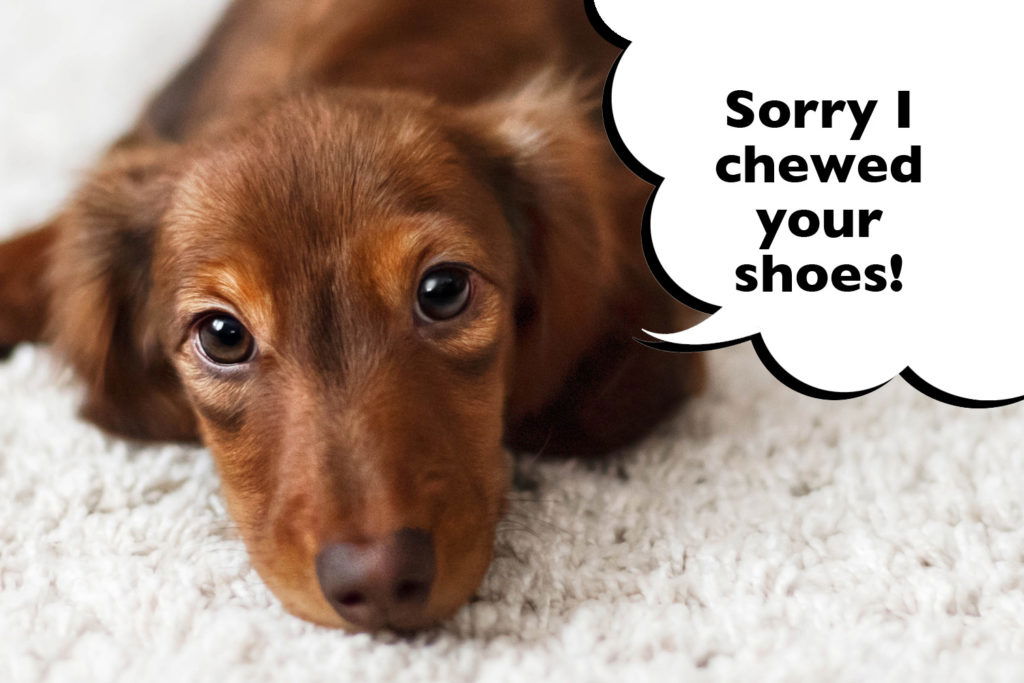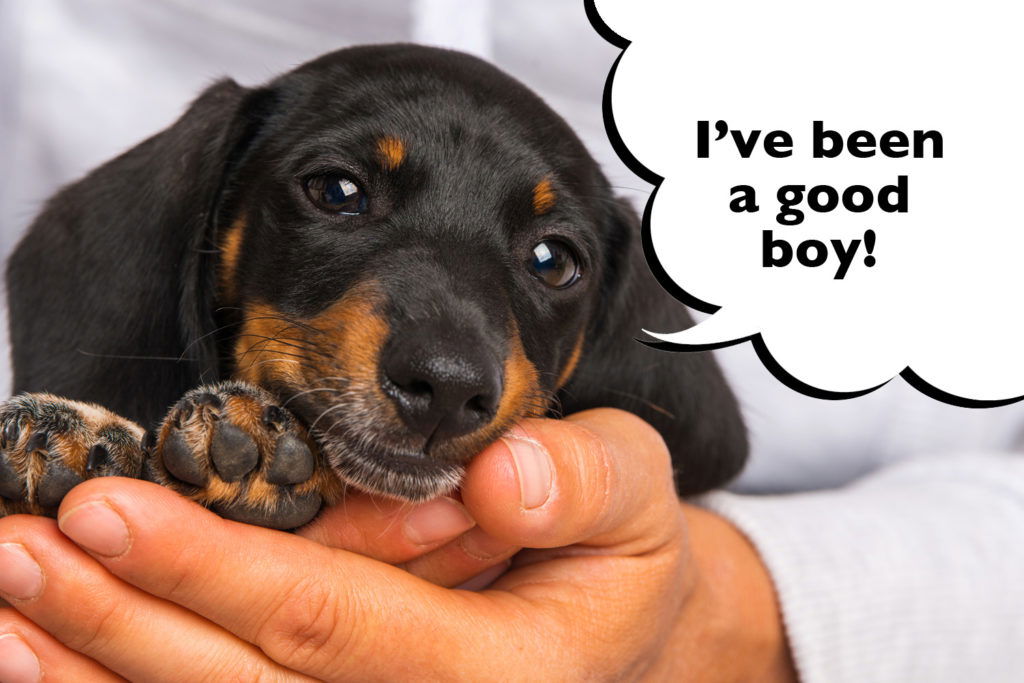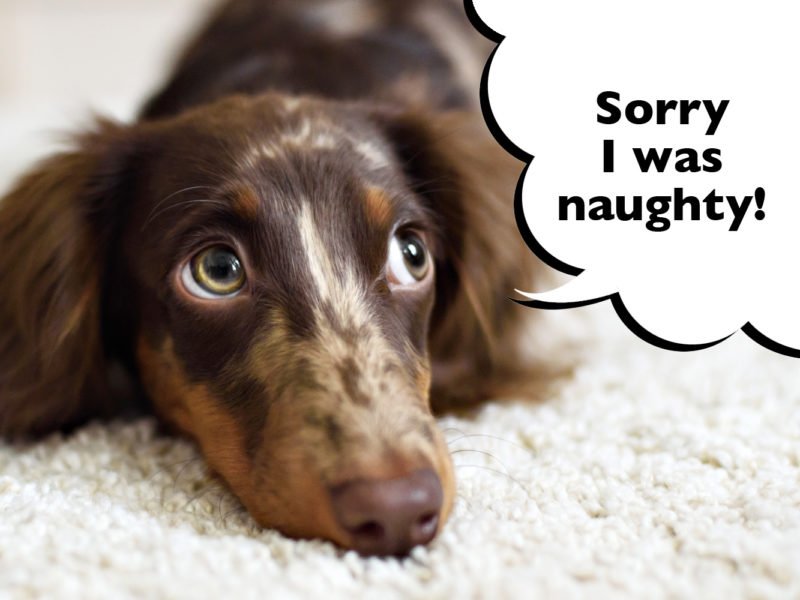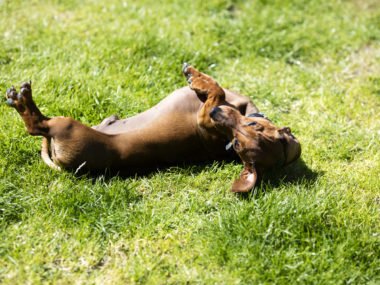Do you have a Dachshund that keeps behaving badly? Are you getting frustrated and don’t know how best to deal with it? Here’s everything you need to know about how to discipline a Dachshund.
How Do You Discipline A Dachshund? The best way to discipline a Dachshund is through positive reinforcement training. This is where you ignore or calmly correct your Dachshund’s bad behaviour, and praise or reward any good behaviour to encourage more of it and teach him what to do.
But, before you start ignoring your Dachshund for scratching your kitchen cupboards, there’s more you need to know! Read on to find out what positive reinforcement training is, whether you should ever punish your Dachshund, and what exactly you need to do.
Table of Contents
This article is based on research and personal experience as a Dachshund owner of 10+ years. I’m not a Vet, qualified dog trainer or dog behaviourist.
What Is Positive Reinforcement Training For Dachshunds?
Positive reinforcement is where you reward and praise your Dachshund when he does things right and ignore him when he gets things wrong. The idea is that he’ll learn the correct behaviours more quickly if he’s rewarded when he does the right thing.
Dachshunds love pleasing people and most are also extremely food-driven. So if he gets lots of praise and treats when he does something right, then he’s highly likely to do it again to get the same reaction.
If he doesn’t get any reward or attention when he does something wrong, he’ll quickly work out that doing the wrong thing is no fun and he’ll stop doing it!
So many people tell their Dachshund off when they do something wrong, and totally ignore them when they’re being good!
All this does is confuse your Dachshund because he doesn’t know what he should and shouldn’t be doing.
It may even make him anxious, frustrated and discouraged because he keeps getting told off all the time.
So if you want a well-behaved Dachshund, you’ve got to understand that he’s never trying to be naughty. If he’s misbehaving, there’s always a reason why.
Perhaps he’s scared, overexcited or feeling playful. Or maybe he simply doesn’t understand what you’re asking him to do, or what he’s even allowed to do.
Once you realise that, you’ll hopefully stop getting so frustrated with your Dachshund and realise that it’s actually YOU that has the responsibility to rectify the situation, not him!
Should I Punish My Dachshund?
Never punish or scold your Dachshund because it’s cruel and won’t achieve anything other than making him scared of you. While it might stop him doing what he’s doing in that moment, it won’t teach him what he’s doing wrong.
If you want to stop your Dachshund doing something wrong, you have to train him on it. It’s your responsibility to help him understand the way you want him to behave.
Just like a baby, you can’t expect your Dachshund to know what to do and how to behave. And, punishing him for mistakes could lead to more behavioural issues further down the line.
Should I Hit Or Smack My Dachshund?
No, it’s NEVER OK to hit a Dachshund. If you do, all you’ll do is scare and confuse him. Hitting or smacking a Dachshund is a sure-fire way to encourage aggressive behaviour and stop him trusting you.
It won’t correct the bad behaviour, it’ll just cause fear and anxiety in your Dachshund which may leave him lacking in confidence.
Dachshunds are very wary of people they don’t trust. So don’t get physical and break the special bond you have.
The best thing you can do is put aside time to train your Dachshund properly. That way you can show him the right way to behave.

Should I Shout At My Dachshund?
No, shouting at your Dachshund won’t get you anywhere. While it might make him stop what he’s doing because you’ve made him jump, it won’t fix anything because your Dachshund can’t understand what you’re saying.
It might even encourage him to keep doing what he’s doing because he knows he’ll get a response from you. Dachshunds LOVE getting attention in whatever form it comes!
Also, Dachshunds sometimes do things that make them look naughty, but they’re actually really stressed. For example, weeing in the house, destroying things or barking when you go out.
So shouting at your Dachshund is just going to make the situation worse, much more stressful and it won’t get to the route of the problem either.
However, you can use calm but firm corrections like ‘No!’. This is not a punishment and can only be used if you catch your Dachshund in the act.
How Do I Discipline My Dachshund?
This is how to discipline a Dachshund using positive reinforcement:
Set clear boundaries
You have to make it really clear what your Dachshund is and isn’t allowed to do. You can’t train him to behave correctly if you’re not 100% clear about what the rules are.
For example, if you don’t want to allow your Dachshund on the sofa but occasionally you let him up, this isn’t going to work.
It’ll be very confusing for your Dachshund and he won’t know what the correct behaviour is.
So don’t make up your rules as you go along, be clear from the off and stick to them!
Get to the route of the behaviour
Before you can train your Dachshund on a certain bad behaviour, you need to understand what’s causing him to misbehave.
For example, if your Dachshund is barking a lot in your house, it’s important to think about why he’s barking.
Is there another dog that lives nearby that he can hear barking? Does he bark when people come to the door? Is your window at street level so he can see people walking past?
Depending on the situation, your Dachshund might be barking because he’s feeling playful, excited, anxious, territorial or scared.
Once you understand what’s prompting the behaviour, you can then work on correcting it with the right training. Rather than just getting frustrated with him every time he barks.
Reward your Dachshund for good behaviour
The key to positive reinforcement is giving your Dachshund a treat or lots of verbal praise and fuss when he does something right.
This reinforces the behaviour and makes it much more likely that he’ll keep repeating it in the future!
Be consistent with your Dachshund
It’s very important to follow through every time you ask your Dachshund to do something, and to stick to the boundaries you’ve set.
This is so your Dachshund doesn’t get confused about what’s expected of him and when.
Establish a routine
By creating a routine for your Dachshund, you’re setting him up for success. That way he’ll know what’s expected of him, making him less likely to act out due to uncertainty.
For example, if your Dachshund knows he’ll be taken out for a potty break at a certain time, he’ll get used to holding his bladder until then
And if he knows he’ll get fed at a certain time, he’ll be less likely to wake you up demanding breakfast.

Be patient
Don’t get frustrated when your Dachshund gets things wrong. This is going to happen from time to time and that’s a normal part of learning.
In fact, if you’re training your Dachshund on something specific, he’ll probably get it wrong a lot to start with!
So be patient and consistent with your Dachshund’s training. He desperately wants to please you, so show him what you want him to do!
Don’t accidentally reward bad behaviour
We can often reward incorrect or bad behaviours without even meaning to. So be really aware of how you react when your Dachshund does something wrong.
If you laugh or pick him up or engage with him in some way, he might well enjoy that reaction and repeat the same behaviour again!
Unless he’s biting you or doing something that really warrants you moving him or saying ‘No!’, it’s best to ignore bad behaviour so he learns nothing fun happens when he does it.
Make it easier to get things right
By dog-proofing you home, you’ll be setting your Dachshund up for success. If you lock away your most valuable things, your Dachshund won’t be tempted to steal them!
Even though your Dachshund still needs to learn right from wrong, moving things out of his reach can definitely help to minimise problems!
Stay calm
Remember that your Dachshund wouldn’t intentionally upset you and he isn’t trying to be naughty.
There’s a reason your Dachshund is acting up, and it’s up to you to help him cope with that and understand what to do. He’s a dog and he’s doing his best to navigate the situation in the only way he knows how.
So, take a deep breath, remember that he’s not trying to be naughty, and go from there. Use positive reinforcement techniques to show your Dachshund what he’s supposed to be doing instead.
Don’t raise your voice
If you catch your Dachshund doing something wrong, you can say a firm but calm ‘No!’ and then show him what he’s supposed to do.
Just don’t raise your voice or shout at him to get your point across. For example, if you catch your Dachshund weeing on the carpet, just say ‘No!’. Carefully pick him up and take him outside, so you can show him where he needs to wee.
Then, next time he wees outdoors, give him loads of verbal praise and a treat so he associates weeing outdoors with lots of nice things and fun.
Do this every time your Dachshund gets it right and he’ll soon get the hang of what you want him to do!
So, there you have it! Different Dachshund behaviours call for different training methods, but as long as you follow the general rule of positive reinforcement, you’ll be able to deal with all behavioural issues calmly and effectively in no time at all!








